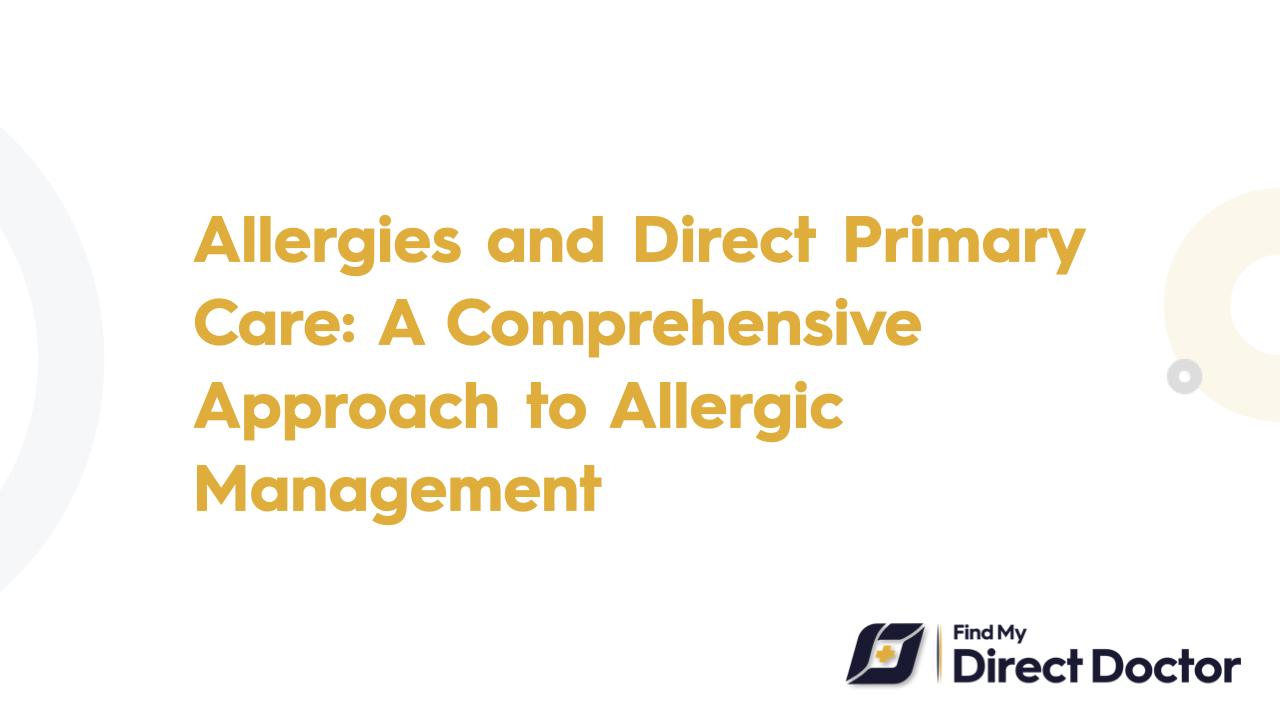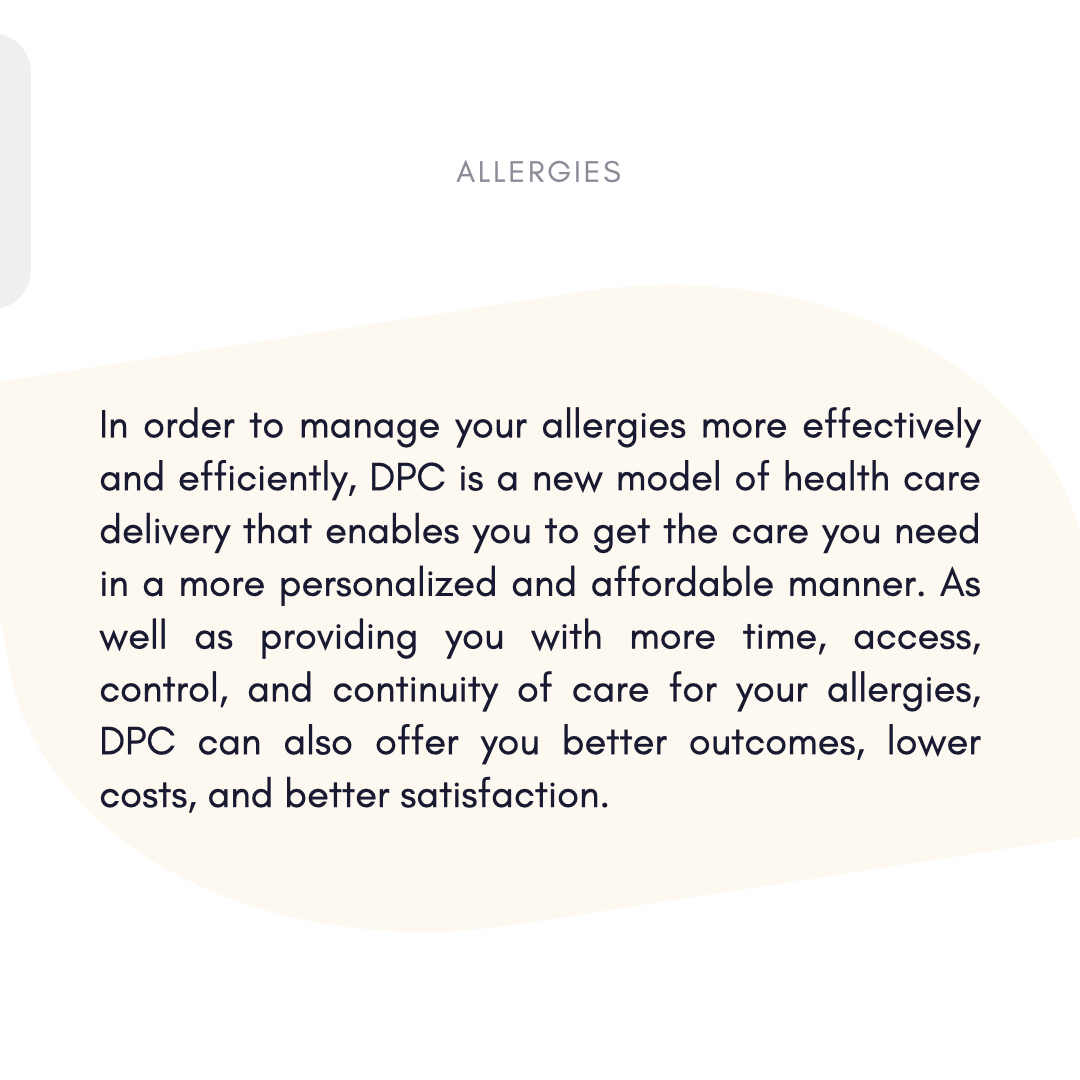Allergies and Direct Primary Care (DPC): Personalized, Proactive Relief
Whether seasonal, food-related, environmental, or otherwise, allergies can interfere with daily activities with symptoms ranging from sneezing to itching to even life-threatening anaphylaxis. Many times, traditional healthcare leaves patients with fragmented treatment or waiting weeks for allergy testing. Combining fast diagnostics, customized treatments, and preventative strategies for long-lasting relief, Direct Primary Care (DPC) presents a simplified, patient-centered method of allergy control. Here's how.

Knowing Allergies: Main Difficulties
- Typical triggers:
- Pollen, dust mites, pet dander, foods (nuts, shellfish), insect stings, drugs.
- Symptoms:
- Mild: Runny nose, hives, sneezing, itchy eyes.
- Severe: Anaphylaxis—drop in blood pressure, swelling, dyspnea.
- Complications:
- Chronic sinusitis, asthma attacks, disturbed sleep, lower quality of life.
How DPC Improves Allergy Control
Under the DPC membership model (USD 50–150/month), patients gain unrestricted access to a primary care physician. For those with allergies, this means:
- No wait times for symptom flare-ups or urgent allergy evaluations.
- Clear pricing: Discounted medications, tests, and specialist referrals.
- Holistic care: Addresses root causes, not just symptoms.
Rapid Diagnosis & Advanced Testing
Following American College of Allergy, Asthma & Immunology (ACAAI) guidelines:
- In-office testing: Skin prick tests or specific IgE blood work to identify triggers.
- Food allergy panels: Affordable cash-pay rates (USD 100–200 vs. USD 500+ with insurance).
- Telemedicine integration: Remote follow-ups or environmental assessments (e.g., home mold inspections).
Personalized Treatment Plans
DPC customizes care per ACAAI and American College of Physicians (ACP) guidelines:
- Medications:
- Antihistamines (loratadine, cetirizine) at wholesale rates (USD 5–10/month).
- EpiPen prescriptions and training for severe reactions.
- Nasal steroids (fluticasone, mometasone) for chronic rhinitis.
- Long-term solutions:
- Coordinate with allergists for allergy shots/sublingual tablets (e.g., Odactra for dust mites).
- Lifestyle changes: Dietary adjustments, hypoallergenic bedding, air purifiers.
Preventive Plans and Instruction
- Allergen avoidance: Tailored plans for travel, pet ownership, or pollen seasons.
- Asthma management: Peak flow monitoring, albuterol/corticosteroid inhalers.
- Environmental control: Education on reducing indoor allergens (dust mites, mold) per ACAAI guidelines.
DPC's Benefits for Allergy Patients
- Prompt Treatment for Flare-Ups:
- Same-day visits for unexpected reactions (swelling, hives).
- Avoid ER costs (USD 1,000+/visit) with at-home guidance.
- Affordable Solutions:
- Epinephrine injectors: USD 50–100 (vs. USD 300–700 retail).
- IgE testing: USD 100–200 (vs. USD 500+ historically).
- Ongoing Monitoring and Support:
- Regular visits to adjust treatments.
- Mental health referrals for anxiety linked to severe reactions.
DPC Customized Allergy Management
The ACAAI stresses individualized attention. DPC delivers:
- Seasonal allergy prep: Start antihistamines 2 weeks before pollen peaks.
- Local pollen alerts: Track via allergy apps.
- Food allergy action plans: Teach EpiPen use and label reading.
- Nutritionist referrals: Ensure balanced, trigger-free diets.
- Telemedicine check-ins: Monitor symptoms or side effects remotely.
- Home environment tips: HEPA filters, mold remediation advice.
Real-Life Success Stories
- Case 1: Emma, 14, avoided ER visits after DPC prescribed an EpiPen post-peanut allergy diagnosis via IgE tests. Her family saved USD 800.
- Case 2: Mark, 42, reduced sinus infections by 80% using DPC-guided dust mite immunotherapy and air filters.
FAQs: DPC and Allergies
- Q: Can DPC administer allergy injections?
- A: DPC coordinates with allergists for shots but doesn’t administer them.
- Q: How does telemedicine help with allergies?
- A: Virtual visits adjust treatment plans and provide environmental advice without office visits.
- Q: Are IgE tests accurate?
- A: Yes—specific IgE testing is the gold standard per ACAAI.
Why DPC Is Changing Allergy Treatment
- Guideline adherence: Follows ACAAI/ACP recommendations for prevention, immunotherapy, and testing.
- Crisis prevention: Early anaphylaxis education reduces hospitalization risk.
- Simplified care: One provider manages allergies, asthma, and environmental triggers.
DPC Helps You Breathe Easier
Allergies don’t have to rule your life. With DPC, gain a partner offering affordable, tailored strategies to control symptoms, prevent emergencies, and enhance your quality of life—all guided by telemedicine and professional standards.






